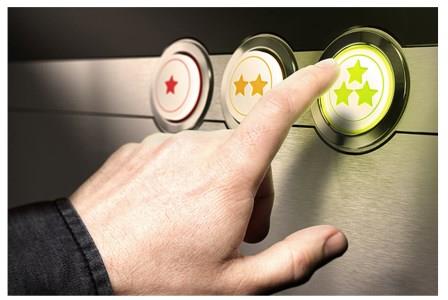Personalizing the consumer experience in physical stores !
 Nowadays as the e-commerce flourish, consumers can find countless alternatives online. The reason consumers visit stores is to find something that cannot be available online, something that is worth the trip and this is the sense of personalization. The current trend of “personalized retail” is the practice of providing an experience in store that is tailored to each guest and perhaps is the only weapon left in physical stores and retailers. The adaptation of the shopping experience can increase profit margins, strengthen customer loyalty and ensure a level playing field with the mobile and e-commerce.
Nowadays as the e-commerce flourish, consumers can find countless alternatives online. The reason consumers visit stores is to find something that cannot be available online, something that is worth the trip and this is the sense of personalization. The current trend of “personalized retail” is the practice of providing an experience in store that is tailored to each guest and perhaps is the only weapon left in physical stores and retailers. The adaptation of the shopping experience can increase profit margins, strengthen customer loyalty and ensure a level playing field with the mobile and e-commerce.
It is no coincidence that 73% of consumers prefer personalized shopping experience. Indicatively, 46% of consumers buy more wh en they have a personalized shopping experience to all sales channels (store, mobile, web), and prefer to be recognized in the store rather than through digital channels and networks. However, a 43% of consumers
en they have a personalized shopping experience to all sales channels (store, mobile, web), and prefer to be recognized in the store rather than through digital channels and networks. However, a 43% of consumers  feel that the service is inadequate whatever network they use, while nearly 58% have low expectations of customer service. These rates are particularly disturbing when one considers that the sellers have just two minutes to engage the visitor in the shop while greeting customers in the first three meters from the entrance and within 10 seconds, increases positive awareness of clients regarding their consumer experience. Moreover, 76% of consumers buy more based on recommendations of sellers. However, too large proportion (75%) of consumers say they would leave the shop if the seller was not well trained.
feel that the service is inadequate whatever network they use, while nearly 58% have low expectations of customer service. These rates are particularly disturbing when one considers that the sellers have just two minutes to engage the visitor in the shop while greeting customers in the first three meters from the entrance and within 10 seconds, increases positive awareness of clients regarding their consumer experience. Moreover, 76% of consumers buy more based on recommendations of sellers. However, too large proportion (75%) of consumers say they would leave the shop if the seller was not well trained.
Therefore, retailers should invest in the personalization of consumer experience, emulating the online practices. The main thing that retailers should do is to make customers want to visit the store. The best way to do this is data mining and personalization of consumer experience to all the sales channels. Therefore modern shops should not isolate purchase in shop from other forms of purchasing. On the contrary, they should be part of this chain (so-called omni-channel consumer experience).
This can be achieved with data collection, online shopping or online visits that did not turned to purchase. The aim the customer to be easily recognizable an d be served based on preferences and interests (from previous purchase history, visits, tests, product returns, etc.) once he enters the store. However, equally necessary is the introduction of new services which can verify that the client is served better, faster and easier and he can feel unique. For example, a large international clothing chain has entered the virtual testing service (virtual fitting) in a pilot store to enable customers to see how one garment or accessory suits in different colors. Moreover, well-known cosmetics chain has introduced the «magic mirror» service at the use of which makeup simulation is available in the client’s face for several products in real time as well as in 3D.
d be served based on preferences and interests (from previous purchase history, visits, tests, product returns, etc.) once he enters the store. However, equally necessary is the introduction of new services which can verify that the client is served better, faster and easier and he can feel unique. For example, a large international clothing chain has entered the virtual testing service (virtual fitting) in a pilot store to enable customers to see how one garment or accessory suits in different colors. Moreover, well-known cosmetics chain has introduced the «magic mirror» service at the use of which makeup simulation is available in the client’s face for several products in real time as well as in 3D.
Of outmost importance are also the loyalty programs offered by retailers and brands. For example, the intention of the customer  market is increased by 20 times when making deals in the shop, or in advance by receiving sms for promotions. Much appreciated are also promotions or gifts given to them on the day of their birthday. However, a large portion of consumers are not particularly satisfied with the loyalty programs. Indeed, 85% of consumers had no news from the company, after enrollment in loyalty and reward programs. A significant 44% say they have had bad experience from their participation in such programs, while 54% of them would stop a loyalty program if not supplied them personalized offers. By contrast, only 36% received the reward offer which motivated to return to the company.
market is increased by 20 times when making deals in the shop, or in advance by receiving sms for promotions. Much appreciated are also promotions or gifts given to them on the day of their birthday. However, a large portion of consumers are not particularly satisfied with the loyalty programs. Indeed, 85% of consumers had no news from the company, after enrollment in loyalty and reward programs. A significant 44% say they have had bad experience from their participation in such programs, while 54% of them would stop a loyalty program if not supplied them personalized offers. By contrast, only 36% received the reward offer which motivated to return to the company.
Consequently, the future of retail is in line with a unique, personalized shopping experience acr oss the consumer. This can be achieved by integrating the consumer experience in the physical store to all sales channels using real-time data, the beacon technology, the introduction of new services combining physical presence in the store and the virtual market / test and program fidelity. Finally, of major importance are also the presence of virtual display in store and properly labeled in the shop, either for browsing the store or for product recognition. Indeed, through the correct store marking you could recommend, educate, connect, inform and inspire consumers.
oss the consumer. This can be achieved by integrating the consumer experience in the physical store to all sales channels using real-time data, the beacon technology, the introduction of new services combining physical presence in the store and the virtual market / test and program fidelity. Finally, of major importance are also the presence of virtual display in store and properly labeled in the shop, either for browsing the store or for product recognition. Indeed, through the correct store marking you could recommend, educate, connect, inform and inspire consumers.
References : Medalion Retail, Aspect (2013), Forbes Brand Voice, Traf-Sys (2014), Allen (2015), www.dkconsultants.gr

